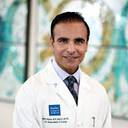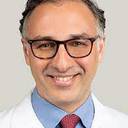It’s unfortunate that many patients suffer with hypogonadism in silence. They may start noticing low energy levels, low libido, erectile dysfunction, or even change in cognition or depression and think it’s the reality of getting older, but many times their testosterone levels are declining. So raising testosterone levels will significantly improve most of these symptoms. To learn about the current and emerging testosterone replacement therapies, join Dr. Brian McDonough as he speaks with Dr. Mo Khera, Professor of Urology and the F Brantley Scott Chair in Urology at Baylor College of Medicine in Houston, Texas.
Addressing Hypogonadism with Testosterone Replacement Therapies
Be part of the knowledge.™We’re glad to see you’re enjoying ReachMD…
but how about a more personalized experience?
Addressing Hypogonadism with Testosterone Replacement Therapies

Announcer:
Welcome to Clinician’s Roundtable on ReachMD. Here’s your host, Dr. Charles Turck.
Dr. Turck:
This is Clinician’s Roundtable on ReachMD, and I'm Dr. Charles Turk. Joining me to discuss current and emerging testosterone replacement therapies, or TRT for short, are Drs. Mohit Khera and Omer Raheem. Not only is Dr. Khera a Professor of Urology but he's also the F Brantley Scott Chair in Urology at Baylor College of Medicine in Houston, Texas. Dr. Khera, thanks for being here today.
Dr. Khera:
Thank you.
Dr. Turck:
And Dr. Raheem is an Associate Professor of Urology at UChicago Medicine. Dr. Raheem, it's great to have you with us as well.
Dr. Raheem:
Charles, thank you for having me.
Dr. Turck:
Well, starting with you, Dr. Raheem, would you give us an overview of the current TRT options?
Dr. Raheem:
So the current status of products we have in the United States, which has passed the FDA approval, is a number of products. We have the gel format, there is oral medications, as well as injectables. There is one more option, which is the insertable pellets that can be done under little procedure to insert those pellets inside the patient body.
Dr. Turck:
And turning to you now, Dr. Khera, what are some therapeutic strategies for low testosterone due to primary or secondary hypogonadism?
Dr. Khera:
So primary hypogonadism means that the testicles are not producing testosterone. Secondary hypogonadism means that there's a problem from the pituitary not sending the signal, called LH, to the testicles. So we have to decide is this primary or secondary hypogonadism? Now I will tell you that irrespective of which one it is, typically the treatment options are fairly similar and the end result is to raise the testosterone with one of the many therapeutic options that are available today. Where this comes to be important is sometimes there can be pathologic conditions, such as a pituitary tumor, that could be causing the low testosterone and those need to be further evaluated.
Dr. Turck:
Now, Dr. Raheem, you've taken us a little bit through these different treatments, delivery options. How about their dosing schedules? What can you tell us there?
Dr. Raheem:
Well, each medication has its own dosing and schedule assigned to them. Again, this is based on the safety profile that the FDA approved for those medications, typically the oral medications, are given daily whether it's once or twice sometimes even three times. There is also injectables, which oftentimes multiple times during the week or even weekly or even bimonthly. There is an option for the gel, which is daily use of gel on the skin of the patients. And the insertable pellets usually done every couple months, every three to six months requirement to reboot the testosterone levels. I also mentioned that there is a newer format, which is the nasal testosterone that can be delivered through the nose that has more also a direct effect of testosterone levels.
Dr. Turck:
For those just joining us, this is Clinician’s Roundtable on ReachMD. I'm Dr. Charles Turk, and I'm speaking with Drs. Mohit Khera and Omer Raheem about current therapeutic options for patients with low testosterone. So with all those treatment options in mind, Dr. Raheem, how do you select the best one for each patient of yours?
Dr. Raheem:
Each patient's different, and they come with other medical problems. I do acknowledge their need and the preference. Some patients are oftentimes taking medication already for other medical conditions. Adding a pill to them may not be a big deal or taking a medication or two. So the oral format will be the best option for them. I do prefer patients to take injectables if they're traveling and they don't want to worry about daily use. Obviously, acknowledging the needle that has to be inserted in the skin, whether intramuscularly or subcutaneously, that can be done on a weekly basis. Patients who prefer gels, also a reasonable option again, acknowledging the daily use of the gels. But again we have options.
Dr. Turck:
And coming back to you now, Dr. Kara, how can we ensure our patients understand their condition, the treatment options that are available to them, and how all of these considerations could affect their overall qualities of life?
Dr. Khera:
I think what's very unfortunate is that many of these patients suffer in silence. They have hypogonadism, they start noticing they have low energy, low libido, erectile dysfunction, maybe some change in cognition, some depression. And they say, ‘I think I'm just getting older,’ but actually many times their testosterone levels are declining, and they don't realize if you raise the testosterone, increase the testosterone level, many of the symptoms that they think are aging will actually significantly improve. So I tell patients, if you have these symptoms, that at the very least check your testosterone level, and if it's low, it may warrant at least a three-month trial to see if those symptoms improve.
Dr. Turck:
As we close our discussion today, Dr. Raheem, let's look ahead for just a moment. What are some emerging treatments on the horizon that could help our patients with low testosterone?
Dr. Raheem:
I think the testosterone therapy has gone through a lot of evolution over the last couple of years. Recently, we have an emergence of oral products for the last couple of years, which has taken over really a good chunk of the usage among older men who need testosterone. I think the research also continuing in this area, I think there is also the injectable format, which has also re-emerged as a once a weekly option with a very reasonable delivery systems that can be very convenient for patients and that will drive compliance if you have a convenient drug that can be delivered to patients on a regular basis. So I think there has been a lot of advances in this area, and it's great to see that to be able, as a urologist, to provide those options to patients, not sticking to all you want, we have a menu just select from based on the patient preference.
Dr. Turck:
Well, with those treatment options available to us, I want to thank my guests, Drs. Mohit Khera and Omer Raheem, for joining me for an insightful discussion on the testosterone replacement therapy landscape. Dr. Khera, Dr. Raheem, it was great having you both on the program.
Dr. Raheem:
Thank you for having me.
Dr. Khera::
Thank you for having me.
Announcer:
You’ve been listening to Clinician’s Roundtable. To access this and other episodes in our series, visit Clinician’s Roundtable on ReachMD.com, where you can Be Part of the Knowledge. Thanks for listening!
Recommended
Overview
It’s unfortunate that many patients suffer with hypogonadism in silence. They may start noticing low energy levels, low libido, erectile dysfunction, or even change in cognition or depression and think it’s the reality of getting older, but many times their testosterone levels are declining. So raising testosterone levels will significantly improve most of these symptoms. To learn about the current and emerging testosterone replacement therapies, join Dr. Brian McDonough as he speaks with Dr. Mo Khera, Professor of Urology and the F Brantley Scott Chair in Urology at Baylor College of Medicine in Houston, Texas.



Facebook Comments